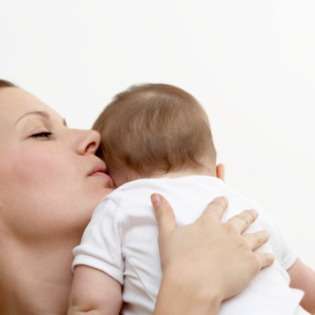Baby Basics: Burping

Burping your baby after each meal is a necessary step that both you and your spouse can take part in. After feeding, your baby will burp to get rid of the excess air that it swallowed while it was taking in the milk. If your baby isn't burped regularly, the accumulated air could lead it to spit up its food, and can make it feel cranky, bloated and colicky.
What to Do
Before you begin, place a towel over your shoulder or under your baby's chin depending on the position you're using. Gently and repeatedly pat your baby on the back to induce it to burp. Sometimes your infant might let out a wet burp, spitting up a bit of milk in the process, in which case you will need to put that towel to good use and wipe off any mess. Keeping a packet of wet wipes nearby might be a good idea.
Common Positions
While you can always experiment with different positions to see which you and your baby find the most comfortable, there are generally 3 popular positions that most parents prefer to use:
- Sitting upright with the baby held against your chest: Firmly hold your baby against your chest with its chin resting on your shoulder as you support its bottom with one hand and use the other to gently pat or rub its back. If you have a rocking chair you can gently rock back and forth while doing this; some parents feel that it helps.
- Laying the baby belly-down on your lap: Place your baby stomach down on your lap, making sure to position its stomach over one leg and its head supported on the other leg. Hold your baby properly with one hand and pat its back with the other.
- Holding the baby sitting up: Sit your baby in your lap in a forward-leaning position while supporting its chest with one hand and rubbing and patting its back with the other. Be careful not to let your baby's head fall backward.
Other Tips
- During the first 6 months of its infancy, you should keep your baby in an upright position when burping it for approximately 10-15 minutes after feeding to prevent it from spitting up its milk. Don't worry if your baby does spit up a few times, however, as this is natural.
- If your baby begins to make a fuss while you're feeding it, stop for a bit and try to burp it before continuing the feeding. Doctors generally recommend that you burp your baby every 60-90 milliliters when bottle feeding, or every time you switch breasts when breastfeeding.
- Change your baby's position if it won't burp after a few minutes in a particular position. Always remember to burp your baby after it has been fed.
- Some babies will have trouble sleeping if they've got gas. Picking up your baby and burping it will help reduce its discomfort and get it to sleep.
- If your baby stops burping after feeding, it usually means that it has learned to swallow without taking in excess air, and hence it is no cause for concern.
Source: www.finebabyworld.com




